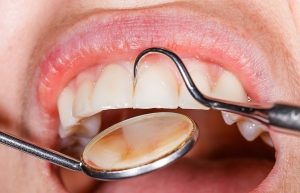What Causes Gum Disease?

Brushing your teeth, flossing, and routinely visiting your dentist in St. Charles for evaluation and teeth cleaning are important components of positive dental hygiene. These elements can help to ensure that you enjoy a lifetime of beautiful teeth that function well. Failing to take care of your teeth and gums, however, may lead to a host of problems that can affect your oral health. Here is a quick look at the causes and risk factors of gum disease.
Gingivitis
Gum disease, or periodontitis, often begins with a case of gingivitis. This precursor to gum disease typically occurs when you fail to provide your teeth with the proper maintenance, and it is characterized by inflammation of the gums. When you neglect your teeth, plaque will build upon their surfaces, and bacteria will cause your gums to become inflamed. Those who suffer from gingivitis may also bleed from the gums when they brush their teeth. Although this condition often develops into periodontitis, it is not a guarantee; addressing the problem immediately and seeking treatment from your dentist can prevent the development of gum disease.
Health Conditions and Medication
Your oral health is connected to your general health in many ways, which means that health conditions unrelated to your oral health can still impact your teeth and gums. Diseases and illnesses that affect your immune system or blood sugar tend to be the ones to increase your risk for gum disease. These include HIV, cancer, and diabetes. In addition to health conditions themselves, the medication you use to treat them may also impact your susceptibility to gum disease. Certain medications that treat convulsions are known to promote gum disease, as are those that inhibit the body’s production of saliva.
Dietary Habits
Your nutrition and daily habits also play a role in the development of gum disease. Try to avoid consuming excessive amounts of sugar and carbohydrates, and make sure you remember to drink plenty of water every day. Additionally, proper vitamin C intake can help your gums heal faster. Any form of tobacco use—cigarettes, cigars, and chewing tobacco—increases your risk for gum disease.
